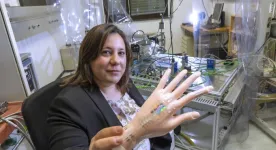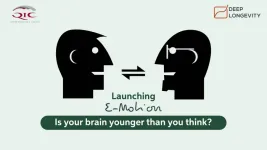(Press-News.org) The language used to communicate fertility awareness should be more empathetic and target both men and women, finds a new study involving UCL researchers.
The review, published in Human Reproduction Open, gives five recommendations on how to promote fertility awareness in a more positive way.
While education about fertility is not intrinsically controversial, finding the right language to address the topic can be difficult – with the risk of causing negative effects such as anxiety, culpability, and stigma.
After reviewing previous studies and literature on the subject, the team were particularly keen to resolve issues around language that could evoke feelings of personal blame, the marginalisation of those struggling to conceive and distress caused by focusing on idealised health situations.
Consequently, they found that it was important to:
Frame fertility awareness messages with reproductive autonomy in mind and aim to be inclusive of those who do not represent the traditional nuclear family.
Be empathetic and steer clear of blame.
Avoid scaremongering and offer a positive angle.
Give due consideration to both women and men in fertility health messaging.
Tailor the messages to particular contexts and audiences and develop resources in close collaboration with the target groups.
Professor Joyce Harper (UCL EGA Institute for Women’s Health), founder and chair of the International Reproductive Health Education Collaboration who wrote the paper said: “Wording messages about fertility in a way that people are willing to accept and without causing offense is a difficult balance. And, while reproductive health education resources exist, the field of reproductive health promotion is in its infancy and more work needs to be done.”
With regards to autonomy, the researchers found that it was important to stress that parenthood is a choice and not everybody may want to have children.
The team also wanted to ensure that reproductive health information was representative of non-binary individuals and those whose sex at birth does not match their gender identity.
Meanwhile, to avoid unnecessary blame or stigma, the researchers say that it may be more useful to offer positive advice about the impact of healthy eating and regular exercise on reproductive health – rather than reinforcing taboos about factors such as weight and obesity, which may cause people to feel shame or distress.
The same positive tone should be used for messaging about the impact of age on fertility. For example, while the chances of having a healthy pregnancy diminish with age, it is not always possible or desirable for people to have children when they are young.
The researchers also recommend not overstating risks to fertility – as this could lead to anxiety.
And they believe it is important to create male-focused messages about how men can contribute to the chance of pregnancy and the health of a future baby – highlighting how reproductive outcomes depend on both sexes.
Finally, in order to tailor health messaging to particular contexts and audiences, the researchers recommend involving those with lived-experience, to ensure that priorities and wording are accurate, helpful and approachable.
Professor Harper said: “Reproductive health communication is a particularly challenging endeavour and needs involvement from different target groups in order to get the messaging right.
“We hope that our five recommendations will provide a basis for more positive communication of reproductive health awareness in the future.”
END
Calls for more positive health messaging around fertility
2023-05-05
ELSE PRESS RELEASES FROM THIS DATE:
ICTA-UAB demands the European Parliament to take action to fight pollution in the Mediterranean Sea
2023-05-05
The implementation of effective policies at local and regional level, and the cooperation of all countries in the Mediterranean Sea basin is urgently needed to successfully reverse the environmental problems in this marine area. This is evidenced by a report carried out by the Institute of Environmental Science and Technology of the Universitat Autònoma de Barcelona (ICTA-UAB) presented in the European Parliament by oceanographer Patrizia Ziveri, who stresses the need to urgently fight against the growing pollution caused by marine litter and plastics in the Mediterranean, to improve current legislation and to monitor new pollutants that ...
Two ERC proof of concept grants for the University of Bonn
2023-05-05
Two researchers from the University of Bonn have been awarded a Proof of Concept Grant by the European Research Council (ERC) as part of a program designed to help researchers translate their ideas from previous ERC projects into commercial applications. Biologist Prof. Dr. Bernardo S. Franklin from the University Hospital Bonn and physicist Prof. Dr. Simon Stellmer will thus each receive €150,000 over a period of around one year.
Prof. Dr. Bernardo S. Franklin from the Institute for Innate Immunity and the ImmunoSensation2 Cluster of Excellence studies hematopoietic stem cells (HSCs), which develop into different blood cells through ...
Smart artificial skin in application check stage: Graz University of Technology researcher wins ERC Proof of Concept grant
2023-05-05
Just a few months ago, Anna Maria Coclite and her team from the Institute of Solid State Physics at Graz University of Technology (TU Graz) presented the results of their research as part of Coclite’s ERC Starting Grant project “SmartCore”. They had succeeded in developing the three-in-one “smart skin” hybrid material, which closely resembles human skin by simultaneously sensing pressure, moisture and temperature and converting them into electronic signals. With 2,000 individual ...
Uncovering the mysteries of alfalfa seed dormancy through multispectral imaging analysis
2023-05-05
Alfalfa (Medicago sativa), commonly called the “King of Grass,” is a legume grown in many parts of the world as a source of animal fodder. It is prized in the forage industry for its high protein content and biomass yield. Recently, alfalfa protein has found applications in aquaculture, pet food industry and human diet. Furthermore, it is seen as an environmentally beneficial crop, with positive impacts on biodiversity and soil nitrogen conservation.
Alfalfa produces two seed types—hard and non-hard—with no obvious visible differences. Unfortunately, the hard seeds ...
New concept for lithium-air batteries
2023-05-05
Lithium-air batteries, also known as lithium-oxygen batteries, are candidates for the next generation of high-energy electricity storage devices. Their theoretical energy storage capacity is ten times that of conventional lithium-ion batteries of the same weight, but they are not yet chemically stable enough to provide a reliable solution. Now a newly launched collaborative research project in which a team from the University of Oldenburg, Germany, led by chemist Professor Dr. Gunther Wittstock is participating is testing ...
Study hints at potential for health conditions to be diagnosed earlier
2023-05-05
Conditions such as coeliac disease and Parkinson’s disease could be detected in principle up to 10 years earlier than they are currently, suggests a new study by UCL researchers.
The study, published in the British Journal of General Practice, reviewed existing evidence on how people’s use of healthcare changed in the weeks, months and years ahead of the diagnosis of a range of conditions. This detectable change in healthcare use indicates the condition’s “diagnostic window” – that is, the point at which diagnosis in some patients may theoretically be possible.
While ...
Playing shadow puppets with NASA's Hubble Space Telescope
2023-05-05
Scientists' Hubble Space Telescope observations of the young star, TW Hydrae may signal new planets under construction.
In 2017 astronomers reported discovering a shadow sweeping across the face of a vast pancake-shaped gas-and-dust disk surrounding the red dwarf star. The shadow isn't from a planet, but from an inner disk slightly inclined relative to the much larger outer disk – causing it to cast a shadow. One explanation is that an unseen planet's gravity is pulling dust ...
Aston Medical School given full approval by the General Medical Council
2023-05-05
Aston Medical School has been given full approval by the General Medical Council (GMC), meaning they can award degrees to graduating students for the first time this year.
The Medical School at Aston University completed the GMC’s rigorous quality assurance process, which began in 2016. The decision, ratified by the GMC’s Council, means Aston Medical School can be added to the list of UK bodies able to award a primary medical qualification.
The approval means that from this summer, medical graduates from Aston University will be added to the medical register and will be able to join the UK’s healthcare workforce ...
QIC reshaping mental health landscape with Deep Longevity aging clocks
2023-05-05
QIC-DVP, an entity of Qatar Insurance Group, the leading insurance provider in the Qatar and MENA region, has launched E-Motion with Deep Longevity. It will enable the populace to measure their customers' psychological age, improve mental health, and increase longevity from the comfort of their home.
The assessment-based and AI-powered digital application has been developed with Deep Longevity's Psychological Age . The technology aims to reinforce mental resilience and wellbeing.
Psychological age, calculated using a proprietary ...
Researchers create a tool for accurately simulating complex systems
2023-05-05
Researchers often use simulations when designing new algorithms, since testing ideas in the real world can be both costly and risky. But since it’s impossible to capture every detail of a complex system in a simulation, they typically collect a small amount of real data that they replay while simulating the components they want to study.
Known as trace-driven simulation (the small pieces of real data are called traces), this method sometimes results in biased outcomes. This means researchers might unknowingly choose an algorithm that is not the best one they evaluated, and which will perform worse on real data than the simulation predicted that it should.
MIT researchers ...






